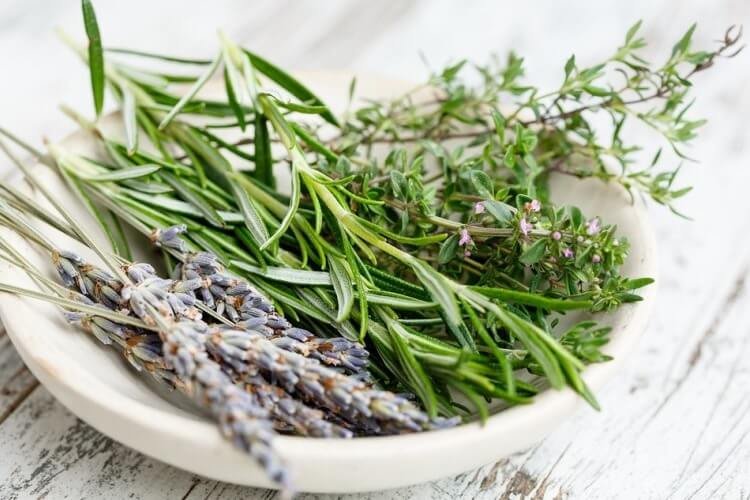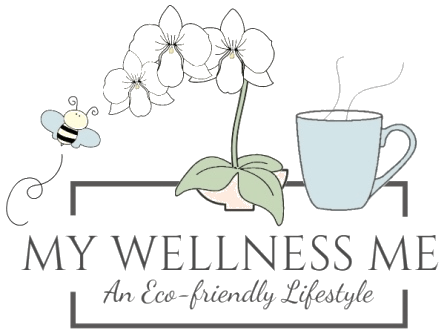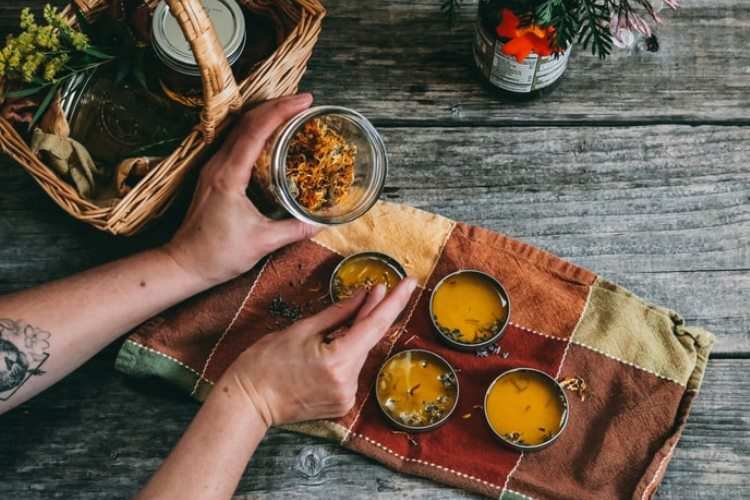A DIY mosquito repellent is the best bet to prevent mosquitoes ruining your pleasant summer evenings.
There are other repellents you can use but what guarantee they have not harmed the environment in some way during the production process?
There’s always the option of putting your nails to task and work on the skin like a caveman or woman or you can live the summer months in a hazmat suit. But those are not feasible options for a normal human being.
Mosquitoes are so annoying.
For an insect with a name that literally translates to “little fly” in Spanish, they are anything but a small problem.
These tiny vampires are responsible for some of the most notorious diseases to ever befall humankind.
And if that’s not nasty enough, a Japanese study found out that mosquitoes can smell your blood, like literally. And if you are type “O,” keep your stake by your side.
But don’t call the authorities just yet.
Try this DIY balm first.
DIY mosquito repellent balm
This recipe does not require you to scour the Black Forest for any extraordinary plant or potion.
It’s quite simple.
To get started, here are the ingredients you need.
- 2 tbsp beeswax pellets
- 2 tbsp cocoa butter (you can also use shea butter)
- 2 tbsp virgin coconut oil or jojoba/sweet almond which I also frequently use. Other oils you can try are sunflower, olive, or witch hazel. If you want to use something different, replace the carrier oil with herbal infused oil (recipe given later in the post.)
- 20 drops essentials oil of your choice (If you are using two essential oils, 10 drops each; if you intend to incorporate three then seven drops of each… you get the math.)
Step 1: Heat the beeswax pellets in a pan. When they start to melt, take the pan off the heat and quickly add cocoa butter and carrier oil and stir them well.
Step 2: Once everything is melted, add the essential oil(s) of your choice.
Note that essential oils have flashpoints and if you add them if the mixture is too hot, they may lose their beneficial properties.
At the same time, the mixture can harden quickly so you have a small window in which to incorporate the essential oil.
You can also add 3 tbsp vanilla extract to the mixture. This is purely optional and works best with lavender oil.
Step 3: Pour the mixture in empty cosmetic jars.
Step 4: Let the balm cool down further and label them. You wouldn’t want this potion gracing your face after cleaning up in the morning. Not that I’m speaking from personal experience ha!
For a milder version of the balm which is ideal for toddlers below the age of four, I recommend using lavender and vanilla for the essential oil.
An alternative for carrier oil – Herbal infused oil
This is the oil I mentioned above as a replacement for carrier oil in the DIY mosquito repellent balm recipe.

To prepare this oil:
Step 1: Set aside 1 cup dried lavender, 1 cup dried lemon balm and 1 cup of any one of calendula, peppermint, lemongrass, or rosemary.
Step 2: In a double boiler, heat them with any carrier oil and simmer for about 30 minutes.
Step 3: Strain the liquid through a cheese cloth into a glass jar. And voila! you have your herbal infused oil.
I typically use the DIY repellent balm during the summers when the mosquitoes clamor for my blood.
You can use them for up to a week provided you put them in air-tight containers and keep in a cool place.
Essential oils in DIY projects are like Alfred Hitchcock in an Alfred Hitchcock movie. They will inevitably make an appearance and I’ll not veer from the script. Find out more about the different types of essential oils.
Essential oils for repelling mosquitoes
Combine 10 drops of essential oil with two tablespoons of carrier oil and store it in a spray bottle. Keep the solution away from sunlight and humidity and you can use it for a month. Apply the mix directly on the skin.
These are some of the best essential oils to use in a DIY mosquito repellent balm: catnip, cedar oil, cinnamon, citronella, clove, lavender, lemongrass, neem, Oil of Lemon Eucalyptus (OLE), lemon eucalyptus, patchouli, peppermint, rose geranium, rosemary, tea tree, and thyme.
Here’s something I want to clarify.
OLE and lemon eucalyptus essential oil sound similar but they are not the same.
OLE vs Lemon eucalyptus essential oil
OLE is derived from the leaves of the lemon eucalyptus tree and enriched for p-Menthane-3,8-diol (PMD), which is an active ingredient in insect repellents.
Lemon eucalyptus essential oil is also extracted from the leaves of the tree but has more citronellal content and much less of PMD.
While both can be used to repel mosquitoes, OLE is a more effective and an extremely popular solution.
Is OLE eco-friendly?
Pretty much.
The production process releases very little carbon, and EPA has registered OLE as a product that is “biopesticide repellent” or one that is made from natural materials.
And don’t forget to do a patch test first before using them. Different skins may react differently to these oils.
Sometimes, just for a change and to give mosquitoes something else to think about, you can use other DIY eco-friendly repellents that do just as well.
Let’s look at some of them.
Other DIY eco-friendly mosquito repellents
Coffee grounds
The Environmental Protection Agency (EPA) suggests coffee grounds as a safe way to repel these critters. Place dry coffee grounds in foil and burn them like you’d do incense. The strong smell can drive mosquitoes away. If the grounds are used and wet, place them in foil and store in a cool place till they become dry.
Fresh herbs
This requires one to chop various herbs like lavender, thyme, rosemary, mint, basil and sage and grind them into a paste. The paste can be applied to dry skin.

You can grow these herbs in your own indoor herb garden.
Sometimes I like to rub fresh lavender directly on my ankles which I’ve noticed mosquitoes find particularly delectable.
Mouthwash and salt mix
Mouthwash typically contains eucalyptol, ethanol, and menthol, all of which can repel mosquitoes. Combine with salt in a spray bottle and apply it on the skin.
What if you are lax with your efforts and a few infantrymen gets past the defenses and sample your protein-rich blood?
There are natural treatments for such an eventuality too.
Treatments for mosquito bite
A paste of equal amounts oatmeal and water can alleviate inflammation and itching.
Similarly, a combination of baking soda and water is another effective remedy.
So is a solution of equal amounts apple cider vinegar and water, with essential oils of your choice, which can be applied through a spray bottle.
Or you can combine a teaspoon of vanilla and half a cup of water and use the mix in a spray bottle.
Plants and vegetables work a treat too. Aloe vera gel, for example, can be an effective remedy. Same goes for a slice of garlic or raw onion. You can apply all of these directly on to the skin.
For short-term relief, try a pack of ice in a bag, which can also reduce inflammation. Don’t keep the ice on the skin for too long though and definitely not without a barrier.
Finally, if you have some spare alcohol from a fun weekend (what spare alcohol?), dab a little on the bitten part. It does a good job of reducing the itch.
Natural preventive measures for mosquitoes
- Wash off the sweat: Sweat attracts mosquitoes. So, wash your sweat off and keep the body cool.
- Cover vulnerable parts of your body: Shelve those Hawaiian shorts and shirts. Some Florida schools have in fact implemented a dress code where students are required to wear long sleeves to protect themselves from mosquitoes.
- Get rid of stagnated water: Mosquitoes breed in stagnated water. Ensure that there is no stagnated water lying in and around the house. Regularly clean roof gutters, pools, trash can lids, buckets, bins, potholes, and tarpaulins.
- Home design: Keep your home clean and equip windows and doors with nets. While you’re at it, you might want to create eco-friendly home interiors using these tips.
- Citronella candles: The smoke from citronella candles repels mosquitoes.
- Replace your regular incandescent bulbs: Replace these bulbs with yellow light bulbs. Mosquitoes prefer brighter lights
- Critters: Lizards find mosquitoes yummy so adopt one or two. Other critters that can do an able job of feasting on mosquitoes are bats. Birds are equally adept and even fish feed on larva.
- Plants: Prallethrin, a common ingredient in mosquito repellents, is found in chrysanthemums. Other plants that can work include aster, basil, citronella, lavender, marigold, pyrethrum daisies, and rosemary..
DEET
Natural remedies are perfect for home solutions or when you are camping in the outdoors.
But DEET (diethyltoluamide) becomes necessary if you are travelling outside the country to a place afflicted by deadly mosquito-borne diseases.
Here’s why.
We’re talking some rather vicious weapons of mass destruction that these little buzzing buzz saws carry in their many missions of doom.
For example in 1793, the mosquito-borne yellow fever claimed the lives of 5000 people in Philadelphia. Yellow fever is still sadly relevant and so are others like chikungunya, dengue, leishmaniasis, malaria, sindbis virus, West Nile fever, and zika, to name a few.
But DEET is not environment friendly, an eco soul may argue.
True that, but as of now it’s the best alternative we have. Also, according to EPA repellents containing DEET are safe for adults and children older than two months, when applied as per instructions.
Why do mosquitoes bite only certain people?
Mosquitoes don’t fancy everything on the buffet.
They are quite picky eaters… or blood drinkers.
Some, like the malaria carrying mosquito, are drawn to bacteria and sweat while others prefer certain odors.
Plus, they are not attracted by the human flesh per se but by what lives on the skin which is a perfect environment for fungi and bacteria. Odors on certain people carrying these microorganisms are just too hard for mosquitoes to resist.
Why do mosquitoes’ bites itch?
This has nothing to do with mosquitoes but our own immune system.
When mosquitoes bite they make sure that saliva is injected into the wound. This stops the blood from clotting and makes drinking it easier.
How does the human body react?
It counters the action with a protein called histamine which is responsible for the inflammation as well as the itching sensation we feel.
Stay with tried and tested solutions
These creatures are annoying, lethal and extremely resilient. And they are unpredictable too; while they may prefer warmer climes, mosquitoes have been found in chilly Greenland as well.
So, any kind of remedy is welcome for such a seemingly irresistible force.
Sometimes, however, the solutions can get silly.
There are ultrasonic devices that allegedly repel or distract mosquitoes by simulating the sounds of the dragonfly, their predator, flapping its wings. These devices also supposedly mimic the sound of a male mosquito that wants to mate.
The issue with this theory is that the devices emit sounds that far beyond the hertz frequency of what male mosquitoes or dragonflies can produce.
The best recourse to repelling mosquitoes, especially if you are into a green and sustainable lifestyle, is to use eco-friendly DIY mosquito repellents as much as you can. You will be saving your health as well as that of the planet.
Do you use any other natural remedy to keep mosquitoes at bay? Let us know in the comments.


10 comments
Oh this is such a good post! I am so prone to getting mosquito bit during the summer so I will have to try some of these out. Thanks for sharing.
Thanks Charity. Nature has all the remedies, doesn’t it? : )
Wow, this was such an informative post! I didn’t know lavender or cinnamon were mosquito repellants, that’s brilliant to know as they’re two of my favourite essential oils. And it looks relatively straightforward to make too, I’ll have to try it. Infinitely preferable to using DEET filled shop bought products. Thank you for sharing this! Lisa
Yes, it’s so easy and smells good too : )
Thanks
Great post! Thank you for this!
Thanks, you’re welcome.
I love being able to craft wholesome salves and balms and even repellant. I have put mint oils in past repellants I have made, and I love a mix of cocoa butter and beeswax! Beeswax itself makes for a smooth finish, and it feels good to use something I made on my skin. 🙂
Thanks so much for sharing this!
I agree beeswax is a great choice for balms and salves. Peppermint essential oil sends mosquitoes scurrying for cover. Very effective at healing itches too.
Glad you found this useful.
Love these natural remedies – I really hate mosquitos and bugs. This is a great post – and one I plan to use this summer!
Thanks Lisa. Have a mosquito-free summer!
Comments are closed.